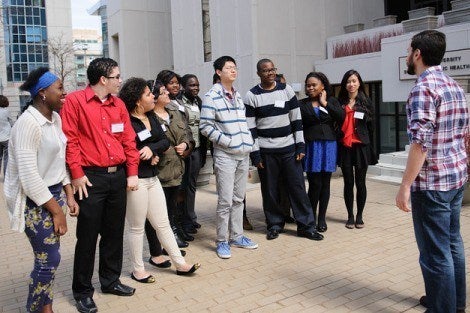May 13, 2014 — Don’t take your toilet and clean drinking water for granted. In many parts of the world, good sanitation systems don’t exist and the consequences—such as deadly outbreaks of waterborne infectious diseases—can be devastating, emergency medicine physician Miriam Aschkenasy, MPH ’03 told a group of Boston and Cambridge high school students recently at Harvard School of Public Health (HSPH).
About 90 students from diverse backgrounds were captivated by Aschkenasy’s account of what it was like to manage a 2009 cholera outbreak in the Republic of Zimbabwe in southern Africa. It only took a few months for 10,000 cholera cases to quadruple, thanks in part to over-taxed latrines, consisting of open air holes in the ground. “Clean water and improved toilet systems remain a key public health need around the world,” she said in her talk, “Water Water Everywhere and Not a Drop to Drink,” on April 11, 2014.
The talk was part of a day-long introduction to public health organized by HSPH students and sponsored by the School and its Office of Diversity and Inclusion. The program included lectures, interactive activities, and campus tours. Co-chairs Claire Perkins, SM’14, and Jason Park, SM’14, and their committee planned the event to give high school students the opportunity to learn about public health and engage with professionals in the field.
“It was eye opening to learn about the problems going on in other countries,” said Andrea Victorian, a junior at Fenway High School. Other schools participating included Cambridge Ridge and Latin, Edward M. Kennedy Academy, Lynn English School, and Newton South High School.
A wide variety of careers
“Public health is more than just nurses and doctors,”keynote speaker Meredith Rosenthal, associate dean for diversity and professor of health economics and policy at HSPH, told the students. Rosenthal described examples of HSPH’s century of contributions to public health. She discussed a range of career paths in the field, including laboratory scientist, mathematician developing models to predict disease outbreaks, and health care policy expert. “There still is much to be done,” she said. “You can start by being a force of change at your school now,” she said. Students can lobby for healthy food options in school to help reduce obesity and organize sports activities after school to increase physical activity.
“I didn’t know there were so many health career options,” said one of the student attendees, who has been contemplating a career in nursing so that she can return to her native Philippines to help people needing medical care.
“It’s so important to have these discussions. It really helps to shape how people think about careers in science and public health,” said Bettie Nolan, assistant head master at the John D. O’Bryant School for Science and Math. “It’s great to extend learning beyond the classroom.”
-– Marge Dwyer
photo: Emily Cuccarese
